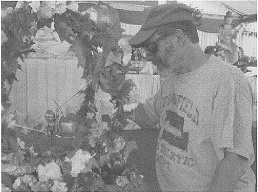|
8 佛陀的真理
於慈悲的萬行裏
寄託其消息
9 凝霜在疏窗
在樹上,在地面上
亦在人心房
10 生活在一起
每人都指正他人
更改卻無人
11 志是去年立
如今功成或未畢?
是,我當盡力
12 人來去匆匆
起起落落在其中
層出永不窮
13 若是要合作
須同心協力幹活
照我說的做
14 不同的文化
恰如剝去香蕉皮
自兩端剝起
15 溼冷的傍晚
垃圾堆裏有殘飯
寒光當頭照*
*註:英文多義,1. 寒光當頭照 2. 神聖的光輝
3. 幾乎免本錢
作者小傳
大衛‧威爾納於1936年在天津出生。越兩年,日本侵略中國,他從蘇俄移民來華的父母,旋又收拾行囊轉赴美國。威爾納就讀柏克萊加州大學,取得戲劇學士學位,並獲戲劇和英文兩科教師資格。
他在大學期間到國外旅遊,足跡踏遍歐洲、小亞細亞、北非和蘇聯。與背景迴異的人晤面,並觀摩他人生活和思考,使他體認到,世界遠大過自己最初狹隘的國家主義觀之所想見。
在肯亞做過「和平法人團體」的義工後,步伐邁向中國各地。後來在中國他當了英文教師,也很開心能夠娶到中國女孩為妻。
1974年,受了日本俳句的影響,雖然俳句極為講究內容和型式,可是威爾納卻也摸索出他獨特的內容,來套用俳句的格式。
他建議,放慢速度來唸他的詩。如此,愉悅和啟發的感受就會自然地呈現。
|
|
8 the Buddha’s gospel
practice of lovingkindness
living the message
9 frost on the window
on the trees, on the ground and
in the hearts of all
10 we live together
one instructs the other how
no one changes though
11 last year’s objective
is it or is it not done?
yes, we will do it
12 we come and we go
in between we rise and fall
many times over
13 co-operation
we need to work together
just do as I say
14 different cultures
a banana is peeled from
two opposite ends
15 a cold damp evening
food scraps found in a dumpster
a light overhead
About the Author
David Vilner was born in Tianjin, China, in 1936. Two years later, during the Japanese invasion of China, his parents, who were Russian immigrants, left Tianjin for America. Mr. Vilner attended the University of California at Berkeley, where he received his Bachelor of Arts degree in Drama and a Secondary Teaching Credential in Drama and English.
During college, Mr. Vilner backpacked throughout Europe, Asia Minor, North Africa, and the U.S.S.R. (now the C.I.S.). Meeting people from completely different backgrounds and seeing how they lived and thought made him realize that the world was larger than his initial narrow nationalistic point of view. After working as a Peace Corps volunteer in Kenya, he traveled throughout China. Later on, he became an English teacher there and was happily married to a lady from China.
In 1974, he was influenced by the Japanese Haiku style of poetry. Although Haiku has strict rules in regard to its form and content, Mr. Vilner has developed his own special content which fits into the Haiku form. He suggests that his poems be read slowly. In this way, a spontaneous reaction may occur — both pleasurable and illuminating.

|